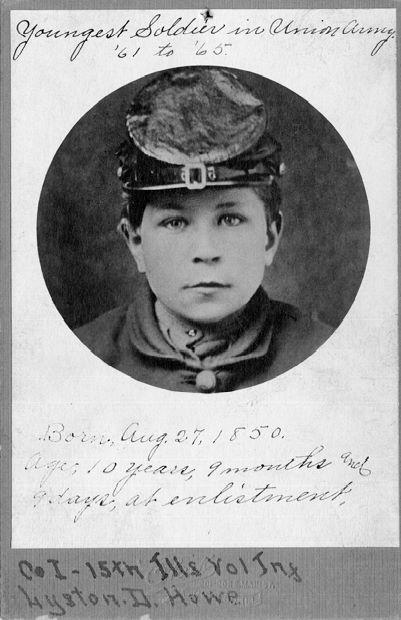
Figure 1.-- Lyston D. Howe was believed to be the youngest boy in the Union Army. But now an 8-year-old drummer was the youngest to serve. Next is Lyston's brother Orion. Lyston had a dangerous boyhood, but managed to live to a ripe old age. |

|
Lyston D. Howe was believed to be the youngest boy in the Union Army. But now an 8-year-old drummer was the youngest to serve. Next is Lyston's brother Orion. Lyston had a dangerous boyhood, but managed to live to a ripe old age. We note Lyston's story published in a modern newspaper, "IT HAPPENED on Shermap's march to the sea. The boy was 13 years old I and an experienced member of the Union Army. He had become separated from his company and now he had been captured by a Confederate lieutenant. The boy did not stay a captive long. Possibly the southern officer was con- fused by the turmoil caused by Sherman s men. Anyway, he did not guard the boy too well. He turned his back once. The boy saw his chance, leaped on the lieutenant's horse, and took himself -and the horse-back to his lines. The boy was Lyston D. Howe of Waukegan and his story has not been pubished. In fact, the boy was forgotten. A box full of Civil war photographs was discovered recently inthe basement of the state capitol in Springfield. One of the pictures was of Lyston D. Howe, a member of company I of the 15th Itlinois volunteers infantry regiment. The picture bore the following notation, Lyston D. Howe, youthful Union soldier.
Born Aug. 27, 1850. Age 10 years 9 months and 9 days at enlistment." He was a drummer boy. The picture now is in the Illinois State Historical society library in Springfield. WHO WAS Lyston D. Howe, and what happened to him? Did the army experience blight his life? We are happy to report that the army didn't hurt Lyston one bit. He did all right. Here is his story, or as much of it as can be learned today, gathered from a dozen sources. He was born in Hiram, O., and the date on the photograph, which coincides with the family records, is correct. His father, William H. Howe, was a mili- tary man who served in the war with Mexico and came out of it a major. When Mrs. Howe died in 1852, Maj. Howe took his two sons, Lyston and Orion, who was two years older than Lyston, to Waukegan. Maj. Howe settled on a farm in or near Waukegan mainly to be near his sister, Mrs. Samuel Shaw, so that she could help care for the motherless boys. WHEN THE Civil war broke out Maj. Howe enlisted in company I of the 15th Illinois, composed largely of men from the Waukegan area. Lyston and Orion joined the same outfit to be with their father. Lyston was a pretty good drummer, but he had a little trouble keeping up with the marching, being only 5 feet 2 inches tall. When he got the measles he was discharged Oct. 21,1861, as a minor. As soon as he was able, Lyston ran away from his nurses and showed up in Paducah, Ky., where he reenlisted in company B, 55th Illinois volunteers. When you inquire what a drummer boy did in the army of Maj. Gen. Wil- liam T. Sherman on its march thru Georgia to the sea, you learn the youngster helped out in the signal corps. That means he saw all of it. That march was not child s play. "Sherman's bummers" cut a path of death and desolation 30 miles wide and 300 miles long. Lyston saw homes go up in flames, with only the chimneys remaining. WHAT DID the boy think of these experiences? Not much, it is to be understood. Perhaps that is the best way. Or he may have felt, as Gen. Sherman expressed it years later, that 'war is war, and you can make nothing else of it." When the war ended Lyston was a veteran, 14 years old. He had been wounded once, but not enough to talk about, he said.
The family moved to Braidwood, Will county, where Lyston eventually became yardmaster of the Alton railroad. When the old Pekin railroad was extended to Streator, Lyston became its first yardmaster there. He married a Streator girl in 1873.
Lyston later entered the coal mining business and invented a coal washer. The Jefferson Coal company was glad to buy that patent. Lyston then became a hardware merchant in Streator and was assessor of Bruce township for two terms. He also was active in Masonic events. He died Jan. 11, 1937, leaving three sons, one of them a doctor who figures in La Salle county history." [Randolph. p. 16.]
Randolph, John. "The littest Yank," Chicago Tribune (May 25, 1958). part 1, p.16.
Navigate CIH Civil War Section:
[Return to the Main individual Civil War musicians page]
[Return to the Main Civil War page]
[Return to the Main military service page]
[Return to the Main U.S. 1860s page]
[About Us]
[Biographies]
[Campaign]
[Causes]
[Emancipation]
[Families and youth]
[Fiscal policy]
[Formations and units]
[Law]
[Railroads]
[Reconstruction]
[Slavery]
[Soldiers]
[Uniforms]
[Weaponry]
[Return to the Main Civil War page]
[Lost Cause]
[Segregation]
[Civil Rights movement]
[Return to CIH Home page]
Navigate the Historic Boys' Clothing Web chronological pages:
[The 1820s]
[The 1830s]
[The 1840s]
[The 1850s]
[The 1860s]
[The 1870s]
[The 1880s]
[The 1890s]
